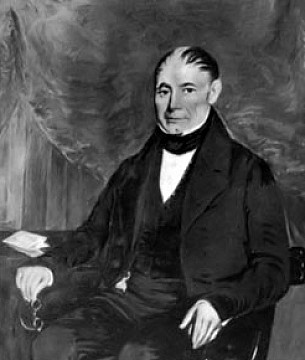Alexander Allan (1780-1854)
"Sandy" Allan, Ship's Captain & Shipowner, of Saltcoats & Glasgow
He was born at Fairlie near Gatehead in East Ayrshire, and he was a first cousin of both the Scottish Bard, Robbie Burns, and of John Galt, "the first political novelist in the English language". At a young age, Sandy was apprenticed to a shoemaker in Kilmarnock, working ten hours a day except for Sundays. By 1800, he was working in Saltcoats by which time his interest had turned towards becoming a ship's carpenter. However, he abandoned that career for a chance to go to sea and he was soon acting as mate to Captain Wilson, of Saltcoats. Within a few years, Sandy had become master and part-owner of several small ships sailing out of Saltcoats. He got his break during the Peninsula War (1808-14) when he was made master of the 175-ton brigantine Hero that was chartered to transport troops and supplies for Wellington's army. By 1814, he had gained a reputation as, "an excellent mariner and a shrewd businessman."
In 1819, following on from the success of the Hero, Allan bought shares in and became master of the Jean (named for his wife) and he established a trade route between Greenock and Quebec that would soon become synonymous with the Allan family name. The Jean held the record for the fastest crossing between the Firth of Clyde and Quebec City. Under Sandy's direction, he oversaw the growth of his business from a one-man operation in wooden sailing ships to the moment when his sons upgraded their fleet to iron steamships. In addition, he also succeeded in helping to establish the Clyde as one of Scotland's most important shipping centres, and by doing so greatly furthered Scotland's commercial interests. Sandy made his final voyage as a ship's master in 1839 before retiring in favour of his sons, but always retained an active interest in the company.
The British TV series The Onedin Line (1971) was loosely based on the Allans' life and fortunes. While 1819 is often given as the founding date of the Allan Line, it wasn't until 1852 that it would become a major shipping company, then under the direction of his sons. By 1884, the Allan Line was the 7th largest shipping line in the world, but contrary to what is popularly recalled it was not the largest privately owned shipping line in the world, that title belonged to the Wilson Line in England. Under a shroud of secrecy, the Allan Line was eventually sold out of the family in 1909 to Canadian Pacific Steamships - see Sir Montagu Allan. Sandy and Jean had five sons (listed). The Allan name lives on in the U.K. but it died out in Canada on the death of Andrew H. Allan in 1959. The Allans both died at the home they'd lived in since Sandy's retirement, 16 Newton Place, Glasgow.
In 1819, following on from the success of the Hero, Allan bought shares in and became master of the Jean (named for his wife) and he established a trade route between Greenock and Quebec that would soon become synonymous with the Allan family name. The Jean held the record for the fastest crossing between the Firth of Clyde and Quebec City. Under Sandy's direction, he oversaw the growth of his business from a one-man operation in wooden sailing ships to the moment when his sons upgraded their fleet to iron steamships. In addition, he also succeeded in helping to establish the Clyde as one of Scotland's most important shipping centres, and by doing so greatly furthered Scotland's commercial interests. Sandy made his final voyage as a ship's master in 1839 before retiring in favour of his sons, but always retained an active interest in the company.
The British TV series The Onedin Line (1971) was loosely based on the Allans' life and fortunes. While 1819 is often given as the founding date of the Allan Line, it wasn't until 1852 that it would become a major shipping company, then under the direction of his sons. By 1884, the Allan Line was the 7th largest shipping line in the world, but contrary to what is popularly recalled it was not the largest privately owned shipping line in the world, that title belonged to the Wilson Line in England. Under a shroud of secrecy, the Allan Line was eventually sold out of the family in 1909 to Canadian Pacific Steamships - see Sir Montagu Allan. Sandy and Jean had five sons (listed). The Allan name lives on in the U.K. but it died out in Canada on the death of Andrew H. Allan in 1959. The Allans both died at the home they'd lived in since Sandy's retirement, 16 Newton Place, Glasgow.










